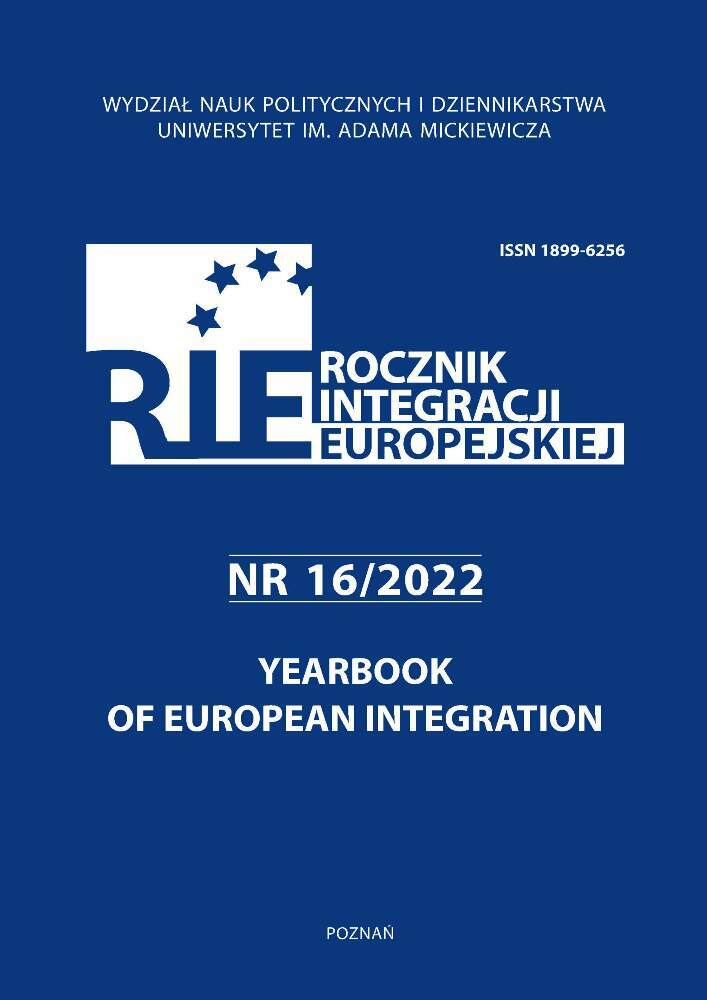Abstrakt
Głównym celem artykułu jest analiza transformacji stylu przywództwa głównych instytucji Unii Europejskiej (Rady Europejskiej, Komisji Europejskiej, Parlamentu Europejskiego) i jego wpływu na działania unijne, podejmowane w zakresie rewizji polityki wschodniej UE, do których doszło w następstwie nielegalnego pełnowymiarowego ataku Rosji na Ukrainę w dniu 24 lutego 2022 roku. W związku z powyższym szczególną uwagę poświęcono omówieniu kwestii ukraińskiej jako czynnika bezpośrednio wpływającego na zmianę pozycji głównych politycznych aktorów europejskich (zarówno indywidualnych, jak i zbiorowych) wobec roli UE jako siły strukturalnej w regionie Partnerstwa Wschodniego. Ponadto nacisk jest położony na główne kwestie wpływające na skuteczność procesów demokratyzacji w Ukrainie po wyborach parlamentarnych i prezydenckich 2019 roku. Kolejnym zadaniem jest ocena działań podejmowanych przez instytucje unijne w celu wsparcia procesów europeizacji w Ukrainie oraz przedstawienia możliwych kierunków współpracy w okresie post wojennym.
Bibliografia
Batumi Summit 2021 Declaration, https://www.president.gov.ua/en/news/deklaraciya-batumskogo-samitu-shvalena-glavami-derzhav-asoci-69609.
Bélanger M.-E., Schimmelfennig F. (2021), Politicization and Rebordering in EU Enlargement: Membership Discourses in European Parliaments, "Journal of European Public Policy", February Issue. DOI: https://doi.org/10.1080/13501763.2021.1881584
Blakesley L. (1995), Presidential Leadership: From Eisenhower to Clinton, Nelson Hall, Chicago.
Braun D., Schäfer C. (2022), Issues that mobilize Europe. The role of key policy issues for voter turnout in the 2019 European Parliament election, "European Union Politics", vol. 23(1). DOI: https://doi.org/10.1177/14651165211040337
Burns J. M. (1978), Leadership, Harper and Row, New York.
Burns J. M. (1984), The Power to Lead: The Crisis of the American Presidency, Simon and Schuster, New York.
Burns J. M. (2003), Transforming Leadership: A new Pursuit of Happiness, Grove Press.
Domaradzki S., Zheltovskyy V. (red.) (2020), Racja stanu Polski w Unii Europejskiej, ASPRA JR.
Dorsey L. G. (2002), The Presidency and Rhetorical Leadership, Oxford University Press, New York.
Eastern Partnership (2022), https://www.consilium.europa.eu/en/policies/eastern-partnership/.
EaP 2030 TRENDS (2019), https://visegradinsight.eu/eap2030/eastern-partnership-2030-trends/
Góra M. (2021), It's security stupid! Politicisation of the EU's relations with its neighbours, European Security, 30:3, s. 439-463. DOI: https://doi.org/10.1080/09662839.2021.1957841
Haran O., Zolkina M. (2014), Ukraine's Long Road to European Integration, "PONARS Eurasia Policy Memo", no. 311, http://www.ponarseurasia.org/memo/ukraine's-long-road-european-integration.
Kakachia K., Legucka A., Lebanidze B. (2021), Can the EU's new global strategy make a difference? Strengthening resilience in the Eastern Partnership countries, "Democratization", 28:7, s. 1338-1356. DOI: https://doi.org/10.1080/13510347.2021.1918110
Keukeleire S., Delreux T. (2015), Competing structural powers and challenges for the EU's structural foreign policy, "Global Affairs", 1:1, s. 43-50. DOI: https://doi.org/10.1080/23340460.2015.983730
Kuzio T. (2006), Is Ukraine Part of Europe's Future?, "Washington Quarterly". DOI: https://doi.org/10.1162/wash.2006.29.3.89
Leonard M. (2005), Europe's Transformative Power, "CER Bulletin", no. 40, http://www.cer.org.uk/publications/archive/bulletin-article/2005/europes-transformative-power.
Nai A., Medeiros M., Maier M., Maier J. (2022), Euroscepticism and the use of negative, uncivil and emotional campaigns in the 2019 European Parliament election: A winning combination, "European Union Politics", vol. 23(1). DOI: https://doi.org/10.1177/14651165211035675
Natorski M. (2022), Resilience in EU crisis interventions in Ukraine: A complexity perspective, "Journal of Contemporary European Studies". DOI: https://doi.org/10.1080/14782804.2022.2097205
Portela C., Pospieszna P., Skrzypczyńska J., Walentek D. (2021), Consensus against all odds: explaining the persistence of EU sanctions on Russia, "Journal of European Integration", 43:6, s. 683-699. DOI: https://doi.org/10.1080/07036337.2020.1803854
Sherr J. (2019), A Tomos for Ukraine's Orthodox Church: the Final Schism?, https://icds.ee/en/a-tomos-for-ukraines-orthodox-church-the-final-schism/.
Strzelecki J. (2018), Relations severed between the Russian Orthodox Church and the Ecumenical Patriarchate of Constantinople: the prospect of a new schism, https://www.osw.waw.pl/en/publikacje/analyses/2018-10-17/relations-severed-between-russian-orthodox-church-and-ecumenical.
Tosiek P. (2019), The Polish Vision of EU Future: Imitation of the Hungarian Model?, "Rocznik Integracji Europejskiej", nr 13. DOI: https://doi.org/10.14746/rie.2019.13.20
Zheltovskyy V. (2020), European integration processes in post-euromaidan Ukraine: in search for scenarios, "Online Journal Modelling the New Europe", no. 34. DOI: https://doi.org/10.24193/OJMNE.2020.32.05
Zheltovskyy V. (2021a), Impact of Eastern Partnership Initiatives on Europeanization Processes in Ukraine, "Online Journal Modelling the New Europe", no. 36. DOI: https://doi.org/10.24193/OJMNE.2021.36.05
Zheltovskyy V. (2021b), Perspektywy rozwoju stosunków Unia Europejska-Ukraina, "Facta Simonidis" 14(1). DOI: https://doi.org/10.56583/fs.12
Licencja
Prawa autorskie (c) 2022 Vadym Zheltovskyy

Utwór dostępny jest na licencji Creative Commons Uznanie autorstwa 4.0 Międzynarodowe.

